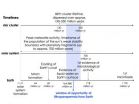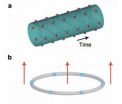(Press-News.org) JACKSONVILLE, Fla. — Men who undergo surgical removal of prostate cancer can experience significant levels of anxiety one year after surgery, and higher levels of anxiety appear to be linked to poor sexual satisfaction and depression, say researchers at Mayo Clinic's campus in Florida. Their recent study, published in the online edition of Psycho-Oncology, suggests that men who experience high levels of "cancer-specific anxiety" following surgery for prostate cancer could likely benefit from counseling designed to address their worries and improve their quality of life.
"The 10-year survival for a man undergoing surgery to remove localized prostate cancer is greater than 95 percent. Given that the majority of men who undergo prostatectomy for prostate cancer will not die from their disease, we are concerned about what life will be like for these patients decades after diagnosis and treatment," says the study's senior investigator, Alexander Parker, Ph.D., an associate professor of epidemiology and urology.
While prostate cancer can be a life threatening disease, most men diagnosed with prostate cancer do not die from it. According to the American Cancer Society, more than 2.5 million men in the United States who have been diagnosed with prostate cancer are still alive.
"The odds of surviving for long periods of time following surgery for prostate cancer are very high," says surgeon and co-author Gregory Broderick, M.D., a professor of urology. "That means a lot of men are living as prostate cancer survivors and we at Mayo Clinic are committed to understanding factors that affect their quality of life, not just their quantity of life."
Dr. Broderick presented these results at the joint meeting of the Sexual Medicine Society of North America and the International Society for Sexual Medicine this summer in Chicago.
Data from studies in patients with other cancer types have shown that anxiety can significantly affect an individual's quality of life. "Our study is the first to specifically show that those men with higher cancer-specific anxiety one year after surgery for prostate cancer are more likely to report lower levels of satisfaction with their sex life and higher levels of depressive symptoms," Dr. Parker says. In their study, the Mayo Clinic researchers examined findings on 365 men who, one year after undergoing surgery for prostate cancer, completed a questionnaire designed to measure anxiety levels about the fact they have been diagnosed and treated for prostate cancer. The men also completed additional questionnaires to measure levels of erectile function, sexual satisfaction and depression.
The results showed that those men who reported high anxiety levels are more likely to report low sexual satisfaction and a high rate of depression symptoms. "What is interesting from the sexual health standpoint is we observed that anxiety was not linked to poor erectile function per se but was linked to low levels of sexual satisfaction," Dr. Parker says. "If our results can be confirmed by other investigators, it would suggest that anxiety is not affecting some men's ability to perform sexually but perhaps more their ability to enjoy their sex life."
While Dr. Parker and his colleagues observed that anxiety was generally higher in those men who had the more aggressive forms of prostate cancer based on their pathology reports after surgery, a number of men with nonaggressive cancer also reported very high levels of anxiety. "Among this specific subgroup of men with prostate cancer who have less aggressive disease we are talking about survival rates of nearly 100 percent, yet they think about cancer every day. This presents a great opportunity for identifying these men and offering intervention aimed at modifying this anxious behavior," Dr. Parker says.
Mayo Clinic already offers cancer patients access to behavior-based counseling led by trained psycho-oncologists. Dr. Parker says the results of this new study underscore the opportunity to test new ways of addressing this need in men with prostate cancer.
"Anxiety about a cancer diagnosis can lead to increased depressive symptoms and an inability to enjoy life's activities, including sexual relations," says Dr. Parker. "We are building on these results by designing trials to test whether counseling can help these patients."
###The study was funded in part by a grant form the Sexual Medicine Society of North America.
About Mayo Clinic
Mayo Clinic is a nonprofit worldwide leader in medical care, research and education for people from all walks of life. For more information, visit END
Prostate cancer diagnosis and surgery can lead to anxiety, depression and reduced quality of life
2012-09-25
ELSE PRESS RELEASES FROM THIS DATE:
New research shows bees decrease their food intake when given compound found in red wine
2012-09-25
TEMPE, Ariz. – The idea that drinking red wine may provide health benefits – or possibly even extend your life — is an appealing thought for many people. Now, there may be added attraction. Researchers have found that when given resveratrol, a compound found in red wine, bees consume less food.
Previous scientific studies on resveratrol show that it lengthens the lifespan of diverse organisms ranging from unicellular yeast, to fruit flies and mice. Since bees are social animals like humans, a team of scientists from Arizona State University, the Norwegian University ...
Study finds germ-killing power in the eyes
2012-09-25
Berkeley — When it comes to germ-busting power, the eyes have it, according to a discovery by University of California, Berkeley, researchers that could lead to new, inexpensive antimicrobial drugs.
A team of UC Berkeley vision scientists has found that small fragments of keratin protein in the eye play a key role in warding off pathogens. The researchers also put synthetic versions of these keratin fragments to the test against an array of nasty pathogens. These synthetic molecules effectively zapped bacteria that can lead to flesh-eating disease and strep throat (Streptococcus ...
Princeton release: Slow-moving rocks better odds that life crashed to Earth from space
2012-09-25
VIDEO:
The researchers explored the likelihood that our solar system exchanged solid matter with its closest planetary-system neighbor during the first hundreds of millions of years it existed. At that time,...
Click here for more information.
Microorganisms that crashed to Earth embedded in the fragments of distant planets might have been the sprouts of life on this one, according to new research from Princeton University, the University of Arizona and the Centro de Astrobiología ...
New CU-Boulder study clarifies diversity, distribution of cutthroat trout in Colorado
2012-09-25
A novel genetic study led by the University of Colorado Boulder has helped to clarify the native diversity and distribution of cutthroat trout in Colorado, including the past and present haunts of the federally endangered greenback cutthroat trout.
The study, led by CU-Boulder postdoctoral researcher Jessica Metcalf, was based largely on DNA samples taken from cutthroat trout specimens preserved in ethanol in several U.S. museums around the country that were collected from around the state as far back as 150 years ago. The new study, in which Metcalf and her colleagues ...
Breast cancer treatment brings sexual difficulties for postmenopausal women
2012-09-25
CLEVELAND, Ohio (September 21, 2012)—Women treated for breast cancer after menopause with aromatase inhibitors have very high levels of sexual difficulties, including low interest, insufficient lubrication, and pain with intercourse. It is an important and underestimated problem, say the authors of a study published online in Menopause, the journal of the North American Menopause Society.
The researchers from Örebro University and Uppsala University in Sweden are the first to look at the impact of this type of breast cancer treatment on specific aspects of sexuality in ...
NASA's Chandra shows Milky Way is surrounded by halo of hot gas
2012-09-25
Astronomers have used NASA's Chandra X-ray Observatory to find evidence our Milky Way Galaxy is embedded in an enormous halo of hot gas that extends for hundreds of thousands of light years. The estimated mass of the halo is comparable to the mass of all the stars in the galaxy.
If the size and mass of this gas halo is confirmed, it also could be an explanation for what is known as the "missing baryon" problem for the galaxy.
Baryons are particles, such as protons and neutrons, that make up more than 99.9 percent of the mass of atoms found in the cosmos. Measurements ...
Melting Arctic ice cap at record
2012-09-25
Think of the poor hamster on the treadmill. Steadily picking up speed and caught up by the momentum, unable to stop until it is overwhelmed and sent tumbling, crashing out of control inside the spinning wheel.
That's the analogy John Yackel, head of the Department of Geography, makes when he considers the annual summer ice melt in the Arctic, which he's been closely monitoring for the past 15 years, documenting the ice cover as it has steadily shrunk in the wake of Arctic and global warming.
Last week marked the unofficial peak, or the end of the summer ice melt, ...
Automatic building mapping could help emergency responders
2012-09-25
CAMBRIDGE, MA -- MIT researchers have built a wearable sensor system that automatically creates a digital map of the environment through which the wearer is moving. The prototype system, described in a paper slated for the Intelligent Robots and Systems conference in Portugal next month, is envisioned as a tool to help emergency responders coordinate disaster response.
In experiments conducted on the MIT campus, a graduate student wearing the sensor system wandered the halls, and the sensors wirelessly relayed data to a laptop in a distant conference room. Observers in ...
A clock that will last forever
2012-09-25
Imagine a clock that will keep perfect time forever, even after the heat-death of the universe. This is the "wow" factor behind a device known as a "space-time crystal," a four-dimensional crystal that has periodic structure in time as well as space. However, there are also practical and important scientific reasons for constructing a space-time crystal. With such a 4D crystal, scientists would have a new and more effective means by which to study how complex physical properties and behaviors emerge from the collective interactions of large numbers of individual particles, ...
Viruses help MU scientists battle pathogenic bacteria and improve water supply
2012-09-25
Infectious bacteria received a taste of their own medicine from University of Missouri researchers who used viruses to infect and kill colonies of Pseudomonas aeruginosa, common disease-causing bacteria. The viruses, known as bacteriophages, could be used to efficiently sanitize water treatment facilities and may aid in the fight against deadly antibiotic-resistant bacteria.
"Our experiment was the first to use bacteriophages in conjunction with chlorine to destroy biofilms, which are layers of bacteria growing on a solid surface," said Zhiqiang Hu, associate professor ...





